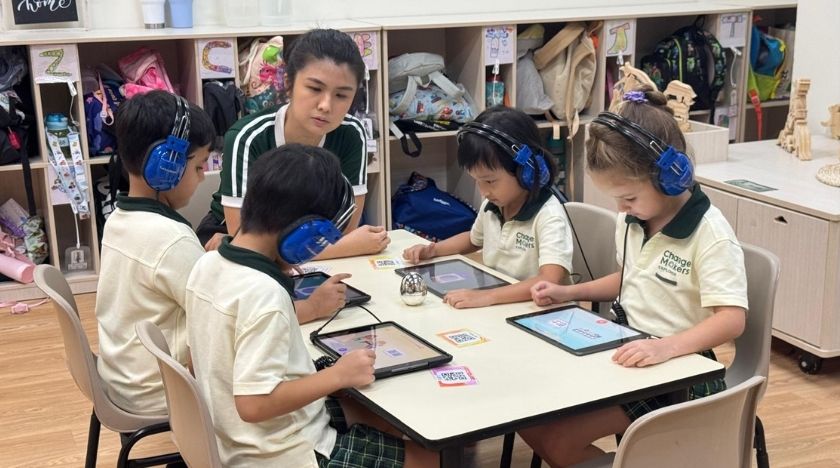![]()
![]()
NTUC First Campus (NFC) Expands Child Support Model to Include Support for Mental Well-being
PUBLISHED
22 August 2022

In line with the increase in national awareness of mental well-being in Singapore, NFC’s Child Support Services (CSS) Department has included Mental Health support under its Child Support Model. With the larger goal of strengthening the resilience of staff and caregivers for children from low-income and vulnerable families, NFC has launched a series of workshops as part of a broader initiative to focus on caregivers’ mental well-being. This includes primary caregivers – such as a parent or grandparent – as well as NFC staff who provide support for those families. The workshops will be spearheaded by NFC’s Mental Well-being Programme Consultant, Dr Ong Mian Li, who received his clinical psychology doctorate in the United States from University of North Carolina at Chapel Hill. Dr Ong completed his postdoctoral fellowship at Mayo Clinic in Rochester, Minnesota.
The Importance of Mental Well-Being in a Post-Pandemic World
A key focus for NFC’s CSS department this year is the mental health of its children and their caregivers. The need for this became prominent as more stress was experienced during the COVID-19 pandemic, leading to a gap in awareness and resources to handle mental health issues at home and in schools – particularly with caregivers of low-income families, who face additional challenges beyond pandemic-related stress. NFC’s approach focuses on imparting coping skills to its staff, parents and children so they can better manage their mental well-being. This is a welcomed addition to the current Child Support Model, which already supports low-income and vulnerable families, as well as children with learning and developmental needs. These different types of support, which were established in 2016, are namely: Financial Support, Social Support, Learning and Development Support and Health and Nutrition Support. With the inclusion of mental health initiatives, the fourth pillar has now evolved to become the Health and Well-Being support pillar.
“Having experienced lockdowns and other uncertainties over the past two years, many parents shared that they are facing multiple life stressors on top of caregiving. Therefore, we have included mental health as an area of focus under the existing Child Support Model to equip parents and staff with the right skill sets to support theirs and their children’s mental well-being, both in school and at home,” said Ms Louisa Chng, Chief Child Support Officer at NFC. According to Dr Ong Mian Li, clinical child and adolescent psychologist, and mental well-being consultant for NFC, addressing caregiver mental health is important for long-term outcomes. “Children who have caregivers with poor mental health are significantly more likely to have poorer general health. This demographic is also more likely to have adverse childhood experiences, such as parental divorce, trauma, and/or nutritional and financial concerns. Addressing caregiver mental health is absolutely critical in sustaining the wellbeing of our children as we navigate a post-pandemic world,” said Dr Ong.
Including Child Enabling Executives in the conversation
Launched in April 2022, one of NFC’s initiatives has included a mental health training programme tailored to its Child Enabling Executives (CEEs), who are the designated first points of contact for low-income and vulnerable parents. The workshop focused on assessing and managing caregivers struggling with making healthy changes, as well as instruction on self-care. CEEs continue to receive ongoing consultation after the workshop as they continue to build mastery in those skills. The intention is for CEEs to impart these skills and knowledge on to the parents so they, in turn, can better support their children’s socio-emotional development at home.
“Dr Ong’s workshop has helped me to set practical and achievable goals with the families. Parents also find it easier to open up and share their challenges with me upon setting the goals,” said Ms Jasmine Lam, CEE at NFC.
Targeting parents to activate sustainable change
To support caregivers’ mental health needs, NFC will also be piloting workshops for parents to manage stress management. The workshops will be conducted by Dr Ong, who will advise best ways to identify, evaluate and manage caregiver signs of stress. These techniques include developing awareness of thinking tendencies, managing emotions, reinforcing existing knowledge of parenting skills and more. In addition, the workshop also serves as a safe space for parents to share and listen to the concerns of other parents. To ensure sustainability, CEEs continue to follow up with those parents after the workshops on a one-to-one basis to support them in the mastery of these skills.
“By creating more avenues for peer interaction, equipping caregivers with skills, and finally equipping the staff that care for these caregivers, we create stronger virtuous cycles of reciprocal support. In the long run, we increase mastery, reduce stigma, and ultimately serve to build a stronger mental health surveillance ecosystem where we are better equipped to look out for one another’s wellbeing,” said Dr Ong.
Media Coverage
- The Asian Parent (22 August 2022): https://sg.theasianparent.com/nfc-expands-child-support-model-to-include-support-for-mental-well-being
Topics:
Share this article
Newsroom
Stay informed on the latest news and happening in NFC and the industry






